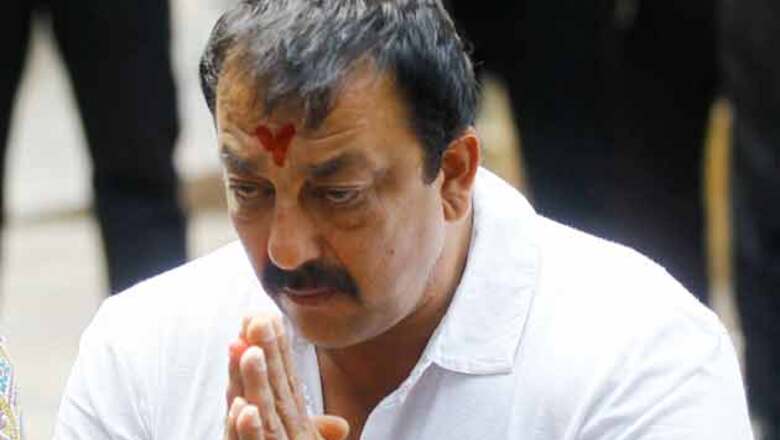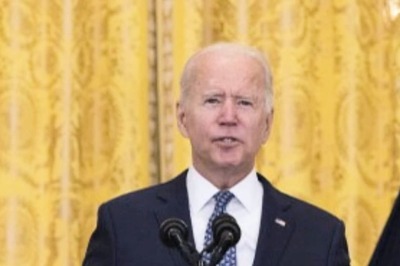
views
New Delhi: Five convicts in the 1993 Bombay blasts case on Wednesday approached the Supreme Court, seeking more time to surrender. This comes after the apex court gave actor Sanjay Dutt four more weeks to surrender in the case.
The convicts who approached the apex court are Zaibunissa Kazi, Altaf Ali Sayeed, Essa Memon, Yusuf Khan, and Yusuf Nulwalla.
Dutt, who had earlier been asked by the court to surrender by April 18 wanted six months' extension to complete his film projects before surrendering to undergo his prison term. The court observed that the producers should have realised and considered that one such case was coming up and questioned as to why they went ahead with projects involving Sanjay Dutt. The court found the argument that there was a huge amount riding on him weak.
The court also said that relief to Sanjay Dutt was given purely on humanitarian grounds. The actor, convicted under the Arms Act in the blasts case, had argued that he was a young man in 1993 and has done a lot of social work since then and so leniency should be shown towards him.
Earlier on Tuesday, the apex court refused to extend time for surrender for Zaibunissa Kazi and two others convicted in the blasts case. The Supreme Court directed them to surrender by April 18.
Reacting to the court order on Sanjay Dutt, Zaibunissa's daughter Shagufta said, "It is very important to be a celebrity in this country is all I can say." "I wish I or my mother was a celebrity," she added.
Zaibunissa had argued that her punishment should be kept in abeyance until the Maharashtra governor or the President of India decides on pardon. 71-year-old Zaibunissa's sentence of five years by the Bombay High court was upheld by the Supreme Court. The Supreme Court had said that all convicts should surrender within four weeks of its upholding the Bombay High Court judgement.
Zaibunisa was charged for possessing illegal arms and ammunition and also under the stringent TADA Act. Former Supreme Court judge and Press Council of India chief Markandey Katju had made a representation to the President on behalf of Kazi on March 18 and on behalf of other two on April 10.
The apex court accepted Sanjay Dutt's plea of humanitarian grounds raised by him for extending the time for surrender. "Considering the peculiar facts and circumstances of the case and reasons stated in the petition, we are not inclined to extend the time by six months. However, we extend the time by four weeks from tomorrow. It is made clear that no further extension will be granted," a bench comprising justices P Sathasivam and B S Chauhan said.
The bench also noted in its order that senior advocate Harish Salve, appearing for Dutt, has agreed to the same that no further extension will be sought. At the outset, Salve said the plea by Dutt is only on grounds of mercy and not on any Constitutional rights. No sooner had Salve commenced his submission, the bench said,"You cannot say your client was unaware of the judgement of the designated court in 2007."
Salve said that a little extension of time to Dutt to surrender would help him to wind up his commitments. "It happens in life" was how Salve described the entire episode.
When the court wanted to know from him what according to him would be a reasonable time to surrender, he said "a little more than eight weeks could be considered purely on humanitarian grounds and mercy". However, CBI counsel and Additional Solicitor General Haren Raval said he has "written instructions to oppose" Dutt's plea. "The present application seeks review of your judgement. It is not a right approach," the ASG submitted. However, the bench said "we can extend the time for his surrender".
At this, Raval informed the court about the order passed yesterday by a bench headed by Chief Justice Altamas Kabir dismissing the petitions of three convicts who had contended that till the mercy pleas filed on their behalf are decided by the President, they should be given time to surrender. Salve said in those petitions, legal grounds concerning Article 21 of the Constitution relating to fundamental right to life and liberty were raised.
Raval said that in those petitions, grounds of age, ill health, among others, were taken and rejected by the court. "Here (Dutt's plea) its a commercial ground," Raval said. However, the bench said it cannot allow same rule in all cases and that it depends on case to case basis. "Here they (Dutt and his lawyer) are only pressing on grounds of mercy," the bench said.
The ASG further argued that allowing Dutt's plea will open flood gates and it would be akin to modification of the March 21 judgement. The bench, however, did not agree with his submission and said, "It is not a modification and we are only extending the time".
Raval replied in the affirmative when the bench asked him "does the present application attract modification". The bench told him that CBI should not have any apprehension against Dutt as it was not going to grant anything longer than four weeks extension for his surrender. "We should not exceed the 'laxman rekha' of four weeks," the bench said.
It also reminded the CBI that the agency did not challenge Dutt's acquittal in the case under the stringent anti-terror law TADA, but preferred many appeals against other accused. "We are saying it in a lighter vein, you have not challenged his (Dutt's) acquittal under TADA when you filed many appeals in other cases. In many appeals filed by the CBI, we extended the sentence," the bench said.
Meanwhile, the apex court's order granting partial relief to Dutt was not welcomed by the counsel for the three other convicts, in the 1993 Mumbai blasts case, who had also sought extension of time to surrender. Farhana Shah, counsel for Zaibunnisa Anwar Kazi (70), Issaq Mohd Hajwane (76) and Shariff Abdul Gafoor Parker (88) alias Dadabhai, said, "It is nice that Dutt has got the relief. Definitely it is sad and disgusting that their (the three convicts) plea (for more time to surrender) on medical grounds was not considered and discrimination prevails everywhere."
"I am very upset. Poor people who really deserve some relief on medical grounds, their plea was not considered. Their condition is so bad that they can't even come on their own and they are aged," she said.
Janata Party President Subramanian Swamy said he was also not happy with today's order. "The judges have shown extra-ordinary consideration for this person (Dutt)...he has shown himself to be a weak person who cannot keep his word." Swamy also said,"Dutt did exactly the opposite of what he had earlier said, that he would surrender on time. I hope that this is the last and final time (that extension is granted), otherwise there will be decline in respect which people have for the Supreme Court." "This is a ridiculous argument that he has previous commitments and has to complete his movies," he said.
The Supreme Court had on March 21, 2013, upheld Sanjay Dutt's conviction in the 1993 Bombay blasts case but his jail sentence was reduced from six to five years. He along with other convicts were given four weeks (April 18) to surrender. Sanjay Dutt has already served 18 months in jail and has to serve the remaining 3.5 years in jail.



















Comments
0 comment